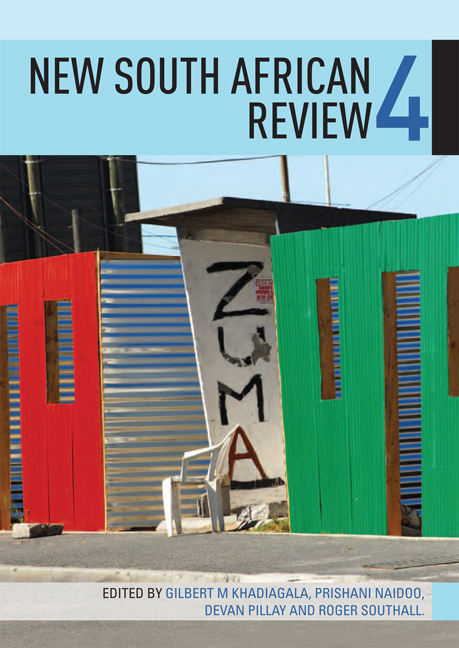Book contents
- Frontmatter
- Contents
- Preface
- Introduction: South Africa's fragile democracy: Twenty years on
- PART ONE ECOLOGY, ECONOMY AND LABOUR
- PART TWO POWER, POLITICS AND PARTICIPATION
- PART THREE PUBLIC POLICY AND SOCIAL PRACTICE
- PART FOUR SOUTH AFRICA AT LARGE
- Introduction
- Chapter 15 South Africa in Africa: Groping for leadership and muddling through
- Chapter 16 South Africa and Israel: From alliance to enstrangement
- Chapter 17 South Africa's economic ties with north-east Asia
- Chapter 18 Regional parastatals within South Africa's system of accumulation
- Chapter 19 The leadership challenge in Southern Africa
- Contributors
- Index
Chapter 18 - Regional parastatals within South Africa's system of accumulation
from PART FOUR - SOUTH AFRICA AT LARGE
Published online by Cambridge University Press: 21 April 2018
- Frontmatter
- Contents
- Preface
- Introduction: South Africa's fragile democracy: Twenty years on
- PART ONE ECOLOGY, ECONOMY AND LABOUR
- PART TWO POWER, POLITICS AND PARTICIPATION
- PART THREE PUBLIC POLICY AND SOCIAL PRACTICE
- PART FOUR SOUTH AFRICA AT LARGE
- Introduction
- Chapter 15 South Africa in Africa: Groping for leadership and muddling through
- Chapter 16 South Africa and Israel: From alliance to enstrangement
- Chapter 17 South Africa's economic ties with north-east Asia
- Chapter 18 Regional parastatals within South Africa's system of accumulation
- Chapter 19 The leadership challenge in Southern Africa
- Contributors
- Index
Summary
The notion of a ‘complex’ has been used to identify related phenomena and how their interaction influences core functioning in a given society. Such ‘complexes’ have been described as theories or systems of accumulation. Globally, the most common ‘complex’ discussed by academics is undoubtedly the American military-industrial complex (MIC), or a variation thereof (Mills 1956). However, it will be argued that such an analysis need not be fixed to the military and industrial relations when it is clear that the relationships and agents in imperial societies (and regionally dominant states or sub-imperial states, in South Africa's case) span many more sectors and operate through more subtle means of persuasion and influence. In apartheid South Africa the military was once considered central in government's decision making and in the allocation of resources – achieved primarily through Armscor, the arms manufacturing parastatal, and its contracting of private industry. But today the military plays a far smaller role in policy making and in driving industry, greatly reducing the analytical use of the concept ‘military-industrial enterprise’ in explaining complex political and economic phenomena in post-apartheid South Africa (see Rogerson 1990).
Fine and Rustomjee's (1996) concept of the minerals-energy complex (MEC) is useful in understanding the history and primary site of accumulation in South Africa. The concept describes a concentration of public and private interests centered on mining and its related industries, notably manufacturing and finance. The historical and post-apartheid expansion of parastatals such as Eskom and Transnet, as state-created monopolies underpinning the functioning of the MEC and its extension into the region, is particularly illuminating (Daniel and Lutchman 2006). It appears, however, that a broader concept may be necessary to describe the myriad post-apartheid business actors and branches of the state. For example, although mining growth is still important to the economy, telecommunications and retail industries have been dominant in South Africa's post-apartheid business expansion (Miller et al. 2008; Simon 2001). ‘Retail, wholesale, motor and hotel trade’ has remained consistently around 14 per cent of gross domestic product (GDP) between 1995 and 2010. Both mining and manufacturing were less than 14 per cent in 2010, with mining substantially less (Van der Wath 2012: 56-57), and both these sectors have shrunk significantly over the past thirty years, with manufacturing dropping off rapidly during democracy (see below).
- Type
- Chapter
- Information
- New South African Review , pp. 332 - 348Publisher: Wits University PressPrint publication year: 2014



